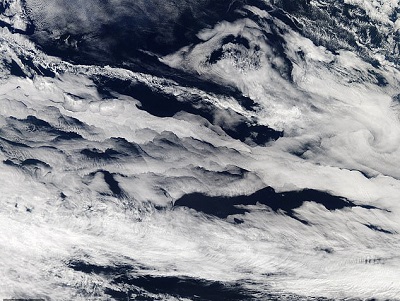Low-level clouds that cover the oceans could DISAPPEAR in the next century as a result of rising CO2 levels and cause climate change to spiral out of control, study warns
Rising greenhouse gases in Earth’s atmosphere could eventually drive low-level clouds out of the skies.
And, this could make global warming much, much worse.
This is according to a new study, which found that high concentrations of atmospheric carbon dioxide cause marine stratus clouds to break up and, eventually, disappear.
Without these clouds, the surface would be exposed to more extreme levels of sunlight, risking global temperature increases upwards of 14 degrees Fahrenheit, according to Daily Mail.
The shocking scenario could help to explain what happened during an extreme warming period roughly 56 million years ago, during what’s known as the Paleocene-Eocene Thermal Maximum (PETM).
And, it provides worrying insight as to what could happen if global carbon emissions aren’t curbed, the researchers say.
During the PETM, Earth experienced a mysterious spike in carbon dioxide that caused the greenhouse gas to accumulate in the atmosphere at extreme amounts over thousands of years.
As a result, temperatures rose globally by 5 to 8 degrees Celsius (9 to 14 degrees Fahrenheit), bringing the average as high as 23 degrees Celsius (73 degrees Fahrenheit).
According to the new study led by researchers at California Institute of Technology, CO2 concentrations higher than 1,200 parts per million (ppm) could push Earth to a tipping point in which marine stratus clouds become unstable.
When these clouds disappear, surface temperatures dramatically increase.
Stratus cloud decks cover about a fifth of subtropical oceans, and shade Earth’s surface from sunlight by reflecting it back to space.
Atmospheric carbon currently sits at around 410 ppm, and is still rising. If emissions continue at the current rates, the researchers say atmospheric CO2 could hit 1,200 in the next century.
‘I think and hope that technological changes will slow carbon emissions so that we do not actually reach such high CO2 concentrations,’ says Tapio Schneider, Theodore Y. Wu Professor of Environmental Science and Engineering.
‘But our results show that there are dangerous climate change thresholds that we had been unaware of,’ the researcher says.
The supercomputer models also suggest the cloud decks won’t return until CO2 levels drop back down below 1,200 ppm.
And, there’s no telling how long that could take.
According to the researchers, these clouds are difficult to resolve in global climate models due to the small scale of the air motions that sustain them.
But, they’re a crucial player in regulating Earth’s surface temperature.
This research points to a blind spot in climate modelling,’ Schneider says.
N.H.Kh

